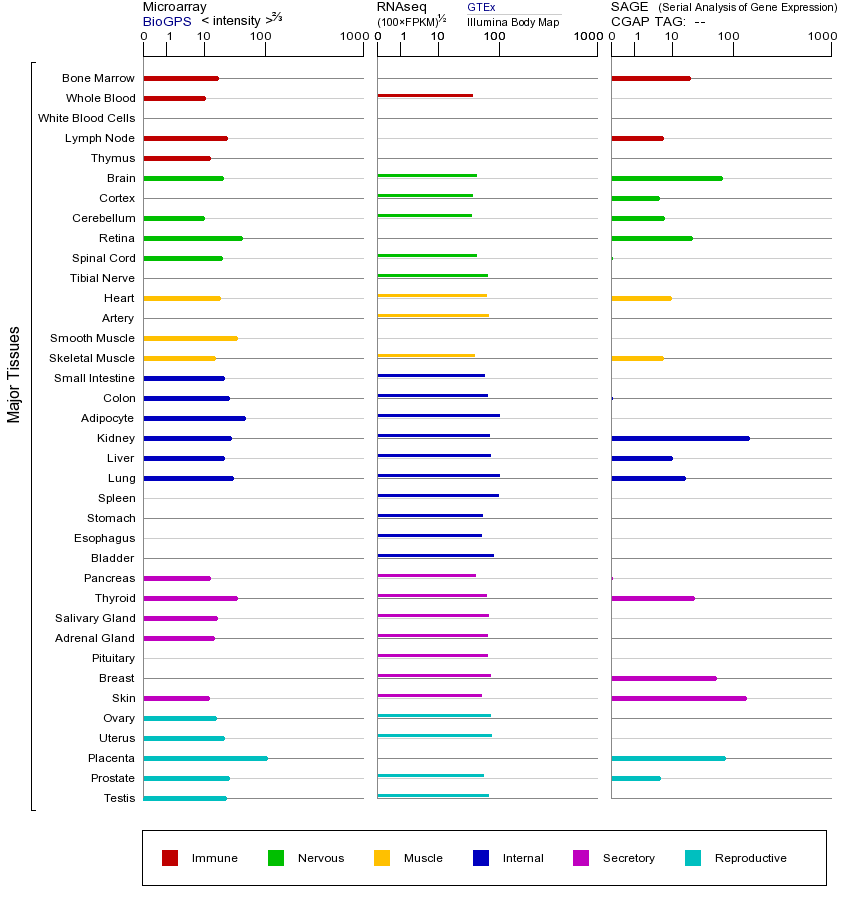CTSL (cathepsin L)
- symbol:
- CTSL
- locus group:
- protein-coding gene
- location:
- 9q21.33
- gene_family:
- Cathepsins
- alias symbol:
- FLJ31037
- alias name:
- None
- entrez id:
- 1514
- ensembl gene id:
- ENSG00000135047
- ucsc gene id:
- None
- refseq accession:
- NM_001912
- hgnc_id:
- HGNC:2537
- approved reserved:
- 1989-03-06
CTSL(组织蛋白酶L)是一种溶酶体半胱氨酸蛋白酶,属于组织蛋白酶基因家族(Cathepsin family),该家族成员主要参与蛋白质降解、抗原呈递、细胞凋亡等生理过程。CTSL在酸性环境中活性最强,能高效降解细胞外基质蛋白如胶原蛋白、层粘连蛋白等,在组织重塑、免疫调节和肿瘤转移中发挥关键作用。其主要作用位点包括溶酶体、内体及某些分泌途径的细胞器。CTSL的功能受其前体酶原激活过程调控,需切除前肽段才能形成活性酶。突变可能导致酶活性丧失或异常激活,例如CTSL突变与早发性周期性脱发(APL)相关,表现为毛囊角质化异常;在肿瘤中,CTSL过表达会促进侵袭转移,与乳腺癌、前列腺癌预后不良显著相关。该基因表达异常还影响病毒感染过程,如促进SARS-CoV-2刺突蛋白切割从而增强病毒侵入。过表达时,CTSL会加速基质降解导致组织破坏(如关节炎中的软骨侵蚀),或通过激活前体分子(如MMPs)促进肿瘤微环境重塑;而敲低表达则可能抑制病原体感染(如阻断埃博拉病毒内体逃逸),但也会导致溶酶体贮积症样表型(如脂褐素堆积)。CTSL与家族成员(如CTSB、CTSD)共享底物特异性重叠的特点,但各成员在组织分布和pH适应性上存在差异。在免疫系统中,CTSL与CTSS协同参与MHC II类分子抗原呈递,选择性缺失会引发CD4+ T细胞应答缺陷。药物靶向CTSL的抑制剂(如Z-FY-CHO)正在研发用于抗肿瘤和抗炎治疗。
The protein encoded by this gene is a lysosomal cysteine proteinase that plays a major role in intracellular protein catabolism. Its substrates include collagen and elastin, as well as alpha-1 protease inhibitor, a major controlling element of neutrophil elastase activity. The encoded protein has been implicated in several pathologic processes, including myofibril necrosis in myopathies and in myocardial ischemia, and in the renal tubular response to proteinuria. This protein, which is a member of the peptidase C1 family, is a dimer composed of disulfide-linked heavy and light chains, both produced from a single protein precursor. Multiple alternatively spliced transcript variants have been found for this gene. [provided by RefSeq, Apr 2012]
由该基因编码的蛋白质是溶酶体半胱氨酸蛋白酶,发挥在细胞内蛋白质分解代谢的主要作用。其底物包括胶原蛋白和弹性,以及α-1-蛋白酶抑制剂,嗜中性弹性蛋白酶活性的一个主要控制元件。所编码的蛋白质已牵涉几种病理过程,包括肌病和心肌缺血肌原纤维坏死,并在向蛋白尿肾小管响应。这种蛋白质,它是肽酶的C1家族的一员,是一个二硫键连接的重链和轻链,无论是从一个单一的蛋白前体产生的组成的二聚体。多重选择性剪接转录变异体也发现了这种基因。 [由RefSeq的,2012年4月提供]
基因本体信息
CTSL基因(以及对应的蛋白质)的细胞分布位置:
- 质膜
- 细胞质
- 细胞外
- 高尔基体
- 囊泡
- 细胞骨架
- 内质网
- 细胞核
- 内体
- 溶酶体
- 线粒体
CTSL基因的本体(GO)信息:
| 名称 |
|---|
| 4145 Phagosome [PATH:hsa04145] |
| 4142 Lysosome [PATH:hsa04142] |
| 4612 Antigen processing and presentation [PATH:hsa04612] |
| 5205 Proteoglycans in cancer [PATH:hsa05205] |
| 5323 Rheumatoid arthritis [PATH:hsa05323] |
| 名称 |
|---|
| Adaptive Immune System |
| Antigen processing-Cross presentation |
| Assembly of collagen fibrils and other multimeric structures |
| Class I MHC mediated antigen processing & presentation |
| Collagen degradation |
| Collagen formation |
| Degradation of the extracellular matrix |
| Endosomal/Vacuolar pathway |
| Extracellular matrix organization |
| Immune System |
| Innate Immune System |
| MHC class II antigen presentation |
| Toll-Like Receptors Cascades |
| Trafficking and processing of endosomal TLR |
| 疾病名称 | 关系值 | NofPmids | NofSnps | 来源 |
| Meningioma | 0.122995792 | 2 | 0 | BeFree_CTD_human_LHGDN |
| Stomach Neoplasms | 0.12 | 1 | 0 | CTD_human |
| Proteinuria | 0.12 | 1 | 0 | CTD_human |
| Liver carcinoma | 0.080271442 | 2 | 0 | BeFree_RGD |
| Pancreatitis | 0.080271442 | 2 | 0 | BeFree_RGD |
| Muscular Atrophy | 0.080271442 | 2 | 0 | BeFree_RGD |
| Brain Ischemia | 0.08 | 1 | 0 | RGD |
| Albuminuria | 0.08 | 1 | 0 | RGD |
| Myasthenia Gravis, Autoimmune, Experimental | 0.08 | 1 | 0 | RGD |
| Diabetes Mellitus, Experimental | 0.08 | 1 | 0 | RGD |
联系方式
山东省济南市章丘区文博路2号 齐鲁师范学院 genelibs生信实验室
山东省济南市高新区舜华路750号大学科技园北区F座4单元2楼
电话: 0531-88819269
E-mail: product@genelibs.com
微信公众号
关注微信订阅号,实时查看信息,关注医学生物学动态。







